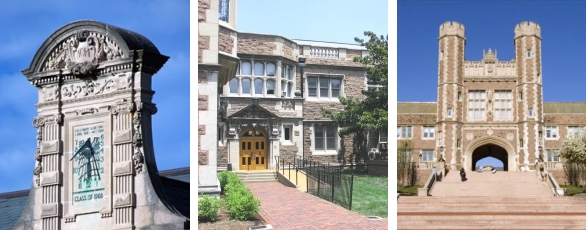Department
of Mathematics, WUSTL -
Math Club, 2008-09
Washington University in St. Louis, Cupples I Hall, One Brookings Drive, St. Louis MO. 63130
Meetings will be in Room 199 in Cupples I.
Talks will run from 5:30 to 6:15, and will be followed by free pizza.
Date: April 20th Room: 199
Speaker: Richard Rochberg Title: Benford’s Law
Abstract: If you go through the first few pages of a newspaper and list all the numbers you find there, what percent of them do you suspect will start with the digit 1? What is the general pattern? What is the history of this observation? What is the theory behind it? Why is the Internal Revenue Service interested?
Date: April 6th Room: 199
Speaker: Andy Soffer Title: Proofs with Pirates
Abstract: No, I will not be making any pirate jokes. I will be going through several graph theoretic theorems, and proving them with the help of pirates. We will prove Euler's theorem, Sperner's Lemma (for fairly dividing cake among three pirates), and maybe a few others. Please leave your eyepatches at the door.
Date: March 23rd Room: 199
Speaker: Jimin Ding Title: Is there a discrimination in graduate school admission? -- Simpson's Paradox Abstract: An observational study on sex bias in graduate school admission was done at UC Berkeley in 1973 (Bickel et al. 1975 Science). Among 8442 male and 4321 female applicants, 44% of men and 35% of women were admitted. Based on a formal statistical test (Pearson Chi-square test), the difference in admission rates appears to provide a strong evidence to show that women were unfairly treated in the admission procedure. However, when each major looked its own admission data separately, no general bias against women was found. On the whole, in fact there is an evidence of bias in favor of women! The puzzle is an example of Simpson's paradox, which will be discussed in this talk. More interesting historical examples will be also given and I will interpret the paradox from the probabilistic and geometric point of views.
Date: February 16th Room: 199
Speaker: Ron Freiwald Title: Calculus without limits Abstract: In the very early days of calculus, for want of somethingbetter, arguments were given that used "infinitesimals" -- numbers assumedto be positive but "infinitely small." Calculus made rigorous (="beginning analysis") didn't arrive until the latter part of the 19thcentury, when a careful definition of limits and the real number systemprovided the tools to banish infinitesimals. In fact, the definitionfinally given for the real number system implies that infinitesimalscannot exist. However, about 1960, a Dutch mathematician named AbrahamRobinson created a new, enlarged number system called the"hyperreals" -- one that contains the real numbers but whereinfinitesimals also exist. Working inside this new system, wecan do all the standard material of calculus with no limits atall. The construction of the hyperreals is too complicated for us todiscuss, but we will describe this new number system and showhow simple some arguments and definitions become wheninfinitesimals are available.
Date: January 26 Room: 199
MOVIE Title: 21 Plot: Students work out how to win lots at Blackjack in Las Vegas.www.sonypictures.com/homevideo/21/
Date: December 1st Room: 199
Speaker: Al Baernstein Title: You might go home again: Recurrence and transience of symmetric random walks in the first three dimension Abstract: Suppose you start at the origin of the real line, toss a fair coin, then move one step to the right or left according as the coin falls heads or tails. Repeat the process, starting from your new position, then repeat again and again, ad infinitum. This process has evident analogues in all dimensions. What is the probability that you will ever return to your starting point? In particular, will you return with probability 1, or is there a positive probability you will never return? We'll see that the answer depends upon the dimension of the world you live in.
Date: November 17th Room: 199
Speaker: Andy Soffer Title: Infinitely many proofs that there are infinitely many primes
Date: October 20th Room: 199
Speaker: Joe Bohanon Title: Adventures in Group Theory
Abstract: Groups are one of the most fundamental tools in mathematics, showing up in nearly every field. Abstractly, a group is a set with a binary relation that satisfies certain axioms which we will define. We will look at groups that show up naturally, specifically the group that lies underneath a Rubik's cube. It turns out that solving the Rubik's cube is more-or-less equivalent to a special case of the "word problem". No prior knowledge of group theory is necessary for this talk
Date: September 29th Room: 199
Speaker: John McCarthy Title: The mathematics of voting, or how to ensure your candidate is democratically elected Abstract: In many elections, the choice of voting system determines the outcome.
Date: September 15th
Movie: “The Proof” This is a one hour movie about Andrew Wiles’s proof of Fermat’s last theorem. (Unlike last year, Shubho has checked that we actually have the right movie this time). Afterwards we’ll have pizza (lots) and say words (a few) about the math club.
